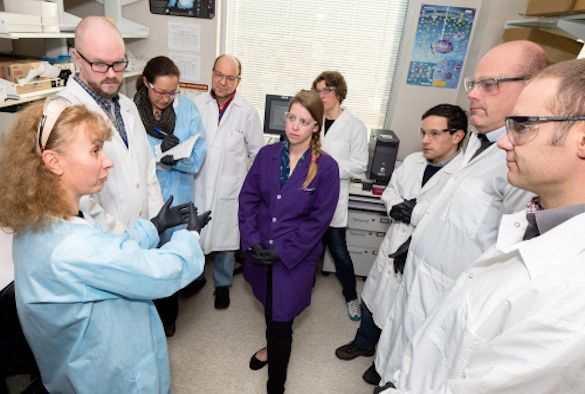
Members of the Core Expert team of the EU-NCL at the NCI-NCL facilities
Dr Neill Liptrott is a tenure track fellow within the Institute of Translational Medicine and a member of the Executive Board, as well as the Core Expert Team, for the recently established European Nanotechnology Characterisation Laboratory (EU-NCL).
“Having previously worked as a guest researcher at the National Cancer Institute’s Nanotechnology Characterisation Laboratory (NCI-NCL), I was excited to be returning to Frederick, Maryland where the NCI-NCL is based.
This time, however, I would be joined by my colleagues from the recently established European Nanotechnology Characterisation Laboratory (EU-NCL) (which the University is a founding partner in) as part of our ongoing partnership with NCI-NCL to establish an infrastructure for the successful translation of nanotechnologies for the treatment of a number of conditions into clinical trials.
The European Union Nanomedicine Characterisation Laboratory (EU-NCL) plans to open for business in mid-2016 with funding from the European Commission and support from the NCL and organizations in France, Germany, Ireland, Italy, Norway, Switzerland, and the United Kingdom.
Thirteen scientists from the EU-NCL core expert team took up space in the offices and labs of our American counterparts for a close-up, day-by-day look at both the scientific and practical aspects of nanoparticle characterization in a U.S. national laboratory.
During our time at NCI-NCL we divided into smaller teams, according to our individual expertise, and spent time with NCI-NCL principal scientists discussing lessons learned from their 12 years’ experience in the characterisation of nanomaterials.
This was supported by sessions with the technicians who run the particular assays so that we could discuss them in greater technical detail in an effort to harmonise the characterisation cascades that both NCI-NCL and EU-NCL use.
Far from being just a one way discussion, the staff at NCI-NCL was very keen to ensure that a dialogue was created so that they could also learn from our expertise and experience.
As Scott McNeil, NCI-NCL Director said: “The collaboration intends to strengthen the industrial nanomedicine community, improve communication among international regulators, and reduce the risk of adverse events in the use of nanomedicine. The initiative will help spur innovation by linking academia and industries, provides an interdisciplinary testing infrastructure for Europe, and help make nanomedicines more widely available to cancer patients internationally.”
During the visit in December we stayed in Jeferson, just outside of Frederick, in a rural farmhouse cooking meals together and comparing notes from the day, helping to solidify our professional relationships.
This visit was a great opportunity to openly discuss technical insights on nanomedicine development, and it helped lay a solid foundation for future joint activities aimed at assisting the next generation of precision medicine.”
